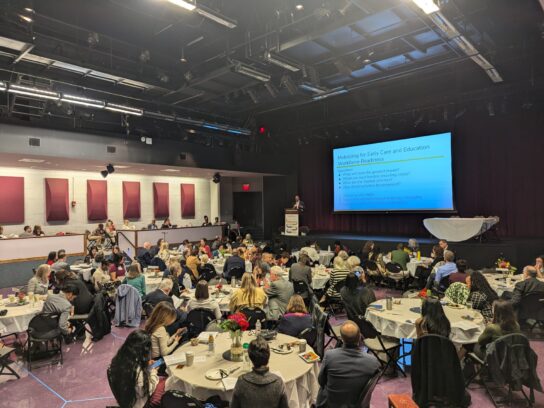
Educators, legislators, non-profit leaders and funders joined together Monday morning to call for a collective way to improve the state of early childhood education.
“It is not an understatement to state that early childhood education in our state is broken,” said Stew Edelstein, retired executive director of the Universities of Shady Grove.
Several hundred people gathered at Montgomery College’s Rockville Campus to listen and make suggestions on how to better fund and attract more workers during a four-hour Montgomery Moving Forward event that was organized by Collective Impact. a network of community members, organizations and institutions working toward “population and systems-level change.”
Councilmember Gabe Albornoz said he would again ask the county council to provide seed money for a Center For Collective Opportunity that would combine government, private industry and non-profits to come up with a way to improve early childhood education and also making it affordable for all.
A brick-and-mortar facility where people would gather information, research and “allow us to look at things with a broad view” is necessary, said Albornoz. He was unable to convince the council to provide funding last year.
Currently, according to the several hundred people gathered, early childhood educators are considered babysitters rather than teachers and are not paid a living wage. Yet, they agreed, starting children on the right educational path is vital for the future of Montgomery County to thrive and have a good workforce.
Anna Hargrave, Executive Director for Montgomery County at the Greater Washington Community Foundation, said the goal is to achieve “a more equitable society.” She added “The scale of the need is so intense.”
Great morning with Montgomery Moving Forward discussing the vital need for our economy and children to have a strong Early Childhood Education workforce. pic.twitter.com/U9TJm4taE4
— Natali Fani-González (@NataliFGonzalez) September 30, 2024
According to Bill Tompkins, president and CEO of the Montgomery County Economic Development Corporation, there are 30,000 small businesses in Montgomery County, all of which need a good workforce.
The county is projected to lose 26% of childhood providers by the year 2027 “unless we do something,” he said. The number of child care providers in the county fell 9.21% between Jan. 1, 2020 and Jan. 1, 2024.
There are 20,000 fewer women in the workforce than there were before the pandemic, he said, noting that the county is losing millions of dollars from the loss earnings of women.
“You better start taking this a lot more seriously,” Tompkins said to a crowd that seemed acutely aware of the problem.
If Montgomery County Public Schools (MCPS) isn’t doing its job, the future workforce will not be good enough, he maintained.
According to Children’s Opportunity Alliance, the percentage of county children who demonstrated kindergarten readiness declined from 54% is 2018-2019 to 44% in 2022-2023.
But many in the audience noted without respect and increased funding, early childcare centers can’t ensure that students will be ready for kindergarten or reading by third grade.
Montgomery Moving Forward recommended childcare providers be provided with stable revenue sources, and equity and licensing standards barriers be removed to grow the workforce.
Another recommendation was to strengthen career paths to increase the workforce and ensure family-sustaining wages.
Most important, members of the audience declared, is to make early childhood education everyone’s issue.
“Everyone in this room has a role to play,” said Adam Luecking, CEO of Clear Impact.
Councilmember Natali Fani-González called for more government funding. “We need money from the federal government for this issue,” she said.
Added Albornoz, “Not one organization, not one department, not one individual, not one person can tackle this. He added, “We keep relying on a few people and that is not sustainable.”
Happening today @montgomerycoll important #MMF conversations about #collectiveimpact & mobilizing for #ECE workforce readiness. pic.twitter.com/licbdLD1EJ
— Susan Cottle Madden (she/her) (@scmadden) September 30, 2024


Comments are closed.